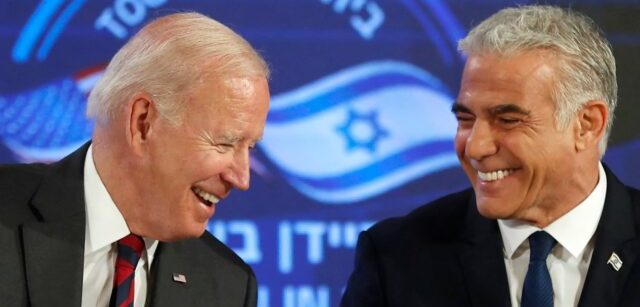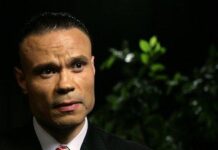President Joe Biden congratulated Prime Minster Yair Lapid on reaching a maritime boundary agreement with Lebanon. He told the Israeli premier that he was “making History.”
Biden thanked Eyal Hulata (head of the National Security Council) for his work and expressed gratitude for the trust and confidence he had in the U.S.-mediated deal, according to a report from the Israeli Prime Ministry’s Office.
Biden noted that attempts to secure the agreement had failed for over a decade. Under the previous Israeli government, Benjamin Netanyahu, the failures were largely due the Iranian-backed Hezbollah terror organization, which effectively controls Lebanon’s political system. Netanyahu has voiced his disapproval of the current agreement, claiming that it was a surrender to Hezbollah.
Biden also stressed his commitment to Israel’s security and stability in the region. The readout stated that the ability of the leaders to collaborate on the maritime agreement was a “testament to the strong, unbreakable bond between them both and between Israel and America.”
A warship from Israel is moored near the disputed maritime border to Lebanon (AFP).
Lapid thanked Biden for his assistance and Amos Hochstein for being a mediator and energy envoy for the U.S. for a deal that “will secure Israel’s northern border security and strengthen the Israeli-Lebanese economies.”
Biden also congratulated Michael Aoun, the Lebanese President, and expressed hope that the deal would lead to a stronger, more stable Lebanon. Lebanon is currently in the most severe economic crisis it has ever experienced.
Lapid had earlier praised the deal as a “historic accomplishment that will strengthen Israel’s security, inject billions in Israel’s economy and ensure stability at our northern border.”
Aoun’s office stated that the final version of Aoun’s offer satisfied Lebanon, met its demands, and preserved its rights to its natural resource rights.
The agreement will allow for energy production from the Karish offshore gas field. This is the core of the dispute between these two countries. Israel claims that the gas field is in its territorial waters. However, Lebanon claims it is partially within theirs. Although technically at war, the two countries never delineated their maritime borders.
Hezbollah is the terrorist group that controls the Lebanese political system. In recent months, Hezbollah has twice attacked the Karish field, threatening war on Israel’s decision to build it. Over the summer, several Hezbollah drones heading for the rig were intercepted by the Israeli military.
According to Israeli sources, the disputed area will be considered Lebanese waters. This has led critics to condemn the Lapid government’s surrender of sovereign Israeli territory to an enemy.
Professor Eugene Kontorovich of the Jerusalem-based Kohelet Policy Forum was the director for international law. He stated that the deal effectively means “Hezbollah now outrides Israel’s democracy.”
Benny Gantz, Defense Minister, stated that the agreement would increase Israel’s security.




